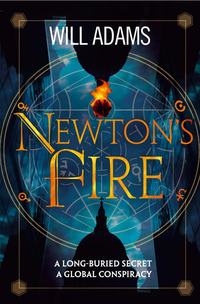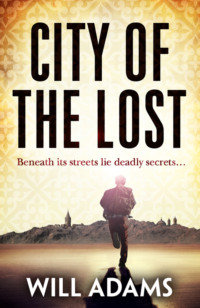
Полная версия
The Eden Legacy
‘Claudia,’ called out the old man from the hotel compound. ‘Claudia!’
‘I go now,’ she said. ‘I see you later, yes?’
‘I hope so.’ He leaned on the porch rail to watch her leave, and was glad to see her put a little extra swish in her stride, just for him.
II
Knox jogged down the bank’s front steps, exasperated by the absurd paperwork required just to change some euros. But it was done at last. Now for some supplies. He walked across town to a small but lively market, a riot of colourful clothing and sparkling costume jewellery, with produce spread out on rickety wooden tables: yellow-brown bananas, orange-green mandarins, plum tomatoes not quite ripe, clumps of garlic and onions, stubby carrots, creamy white manioc, coconuts both hairy and husked, clutched fists of lettuce, pumpkins, papaya, glistening steel bowls of rice and beans.
The brilliant sun in the unpolluted sky gave the slightly eerie impression of being underwater. Greasy tables of zebu steaks buzzed with fat sapphire-and-emerald flies. Salted sardines glittered like spilled chests of silver coins. A crone sat astride two wicker baskets of orange-red crabs, thrusting her bamboo cane into the writhing intestinal mass, irritating pincers until they snapped and clenched the cane so tightly she could lift them out and shake them off into a bucket. He bought fish, rice and other supplies to eat that night in case they didn’t reach Eden by sunset, added some biscuits and bottled water.
Time to get back to the pirogue. He took a moment to get his bearings. He could see a line of palm trees above some shacks to his right, their fronds swept back like hippies walking into the wind. That had to mark the shore. He set off towards them before catching a glimpse of the beach down the far end of a narrow alley between two lines of huts. He turned and ambled along it, utterly oblivious of the man following a dozen paces behind.
ELEVEN
I
Tulear’s Commissariat Centrale de Police was a yellow two-storey building near the centre of town, its front pockmarked like a war zone. Rebecca asked for Chief of Police Andriama at the desk, and a young man in jeans and a brilliant white short-sleeved shirt took her upstairs to his office and grandly threw open the door. A breeze from the open windows riffled loose papers on the desk, forcing Andriama to slap them down before they scattered. He noticed Rebecca at the same moment, however, and seemed to forget about his papers, springing to his feet and coming over to welcome her, taking her hand in both of his, stroking it like a pet hamster. ‘At your service, madame,’ he beamed, exposing blackened stubs of teeth rotted almost down to the gums. ‘How may I help?’
‘I’m Rebecca Kirkpatrick,’ she told him. ‘I’m here about my father and sister.’
‘Ah. Yes. Of course.’ He instantly let go of her hand, assumed a more sober expression. ‘Such terrible news. Sit. Please sit.’ Like so many Malagasy, he was a cocktail of races: short and wiry like a Polynesian, dark-skinned as an East African, yet with the satin black hair of a Chinese. ‘Such a good man, your father,’ he sighed. ‘Such a good friend to Madagascar. And your sister, too. So young. So pretty. Such a terrible loss.’
‘Loss?’ Rebecca’s heart clenched.
‘Forgive me,’ he said. ‘But surely you appreciate the situation—’
‘Are you giving up already?’
‘Certainly not. We’re doing all we can.’
‘And that is?’
‘My officers have been to your father’s house and the local villages. They have spoken to many, many people, including two fishermen who saw your father’s boat outside the reefs.’ He pulled a face. ‘At least, that’s what they say, but you know the people up there, they’ll say anything to please. After that, nothing until evening when the South Africans found your father’s boat drifting and abandoned. I have copies of their statements, if you want to see?’
‘Please.’
He rummaged through his drawers, produced some poor-quality photocopies of several hand-written pages that she flicked through while he talked. ‘There were some traces of blood on the guard rail and on the deck,’ he said. ‘The university is testing it at this moment. Most likely your father’s or your sister’s, but unless we can check it somehow to make sure …’ He drifted meaningfully to a halt.
She squinted at him. ‘You want me to get you their blood-type information?’
‘Your father and sister run a clinic up at Eden, don’t they? I’m sure they’ll have records.’
‘I’ll have a look. In the meantime, perhaps you could continue telling me about your search. The helicopters. The boats.’
He smiled politely. ‘You must understand something, Miss Kirkpatrick. Madagascar is a poor country. Tulear is its poorest region. Even at the best of times, our resources are strained. This is far from the best of times. Besides, whatever has happened to your father and sister, it is almost certainly not a police matter.’
There was a knock on the door at that moment, and a middle-aged man with lustrous black hair poked in his head. His face lit up when he saw Rebecca. He was Mustafa Habib, he told her, advancing uninvited into the room, an excellent friend of her father’s. Rebecca wouldn’t remember him herself, but he’d known her as a child. She did remember him, as it happened; an import–export trader who’d procured obscure equipment for her father. When she told him so, his eyes gleamed with pleasure. He took a card from his wallet. ‘If there’s anything I can do. Anything at all.’ He coughed diffidently. ‘I know this is indelicate, but I must say it all the same. Unfortunate personal experience taught me how painful it can be to arrange … sensitive matters in foreign countries. If you should need any help at all, it would be a privilege. Your family has done so much for our country.’
‘Thank you.’
‘You have transport? A driver?’
‘Yes.’
‘A place to stay? My own home is of course humble, but you would honour us with your—’
‘I’ll be staying at Pierre’s.’ There was little she could achieve in Eden tonight, and she was anxious to meet her nephew, make sure he was safe. ‘Then home tomorrow.’
‘Of course.’
She turned back to Andriama. ‘You were telling me how my father’s disappearance wasn’t of interest to you.’
Andriama sighed. ‘All I said was that it’s probably not a police matter. Our coast here is treacherous, all these tides and currents and reefs. When you were younger, you must have seen for yourself the occasional freak wave. They can come out of even the calmest seas and catch the most experienced fishermen by surprise. Why not your father and your sister?’
‘So you’re not even considering kidnap or robbery?’
‘Of course we consider such things. But your father was not wealthy enough to kidnap, and sensible kidnappers would surely have taken hostage either your father or your sister, so that the other could be free to put the ransom together. Anyway, wouldn’t we have had a demand by now? As for robbery, your father and sister were well known and loved along the coast. Everybody knew they’d share what they had for the asking. It would have been fady to rob them. You know fady? Forbidden.’
‘I know fady.’
‘Besides, what kind of thieves would let a valuable boat simply drift away? No. Robbery makes no sense. It was an accident. A tragic accident.’
‘You’ve given up,’ she said.
‘I’m being realistic.’
‘They’re not dead.’
Andriama assumed an expression of sadness. ‘I pray that you are right,’ he told her. ‘Truly, I do. But I fear the evidence is—’
Rebecca patted her heart. ‘They’re not dead,’ she told him. ‘And I’m going to find them.’
II
Boris popped the buckle of his new knife’s sheath as he followed Knox down the alley, gripped it firmly by its hilt. The feel of it brought back vividly his first time, nearly twenty years ago now, as a young farm-worker seeking general vengeance for the rape and murder of his mother, one of the many atrocities of Georgia’s brutal civil war, but the only one that had mattered to him. They’d been waiting in ambush beneath a thin line of trees for an approaching patrol. He remembered still lining his man up in his sights, the way he’d fallen in the snow, the inhuman sounds he’d made as he’d struggled against his fate, reaching out a beseeching arm for the comrades who’d already turned and fled. Bullets had been too precious to waste, so Boris had drawn his knife as he advanced upon his man. It had been so obvious that he was dying, however, that he’d just stood there watching with his companions until it was over; and, afterwards, he’d been struck most by his own detachment, his lack of feeling anything at all.
Some fence-posts had collapsed ahead, brought down by the weight of a makeshift fly-tip that had spilled out into the alley, stinking and buzzing with flies. Boris couldn’t have asked for anything better. Getting this kind of operation right depended on knowing exactly what you intended to do. He therefore rehearsed it in his mind like a high-jumper before starting his run-up: left hand over Knox’s mouth to keep him quiet, right hand sawing through his throat. Then heave him up and over the flytip, take some pictures with his camera-phone before covering him with his groundsheet, kicking rubbish over him. With luck, even if his disappearance provoked a search, it would be a day or more before he was found. Plenty of time to fetch Davit and make their escape.
He quickened his pace, turned the knife around in his hand, the better to carve through Knox’s throat. He was just two paces behind him when a pair of girls playing tag ran shrieking into the end of the alley ahead. They saw Knox and Boris, shrieked gleefully some more, turned and fled. Knox must have seen the flicker in their eyes; he glanced around and saw Boris so close behind that it made him start. ‘Christ!’ he said. ‘I didn’t realise you were there.’
Just for a moment, Boris considered going for it anyway, but then he remembered that this man had bested Mikhail Nergadze in single combat—Mikhail Nergadze, the only person who’d ever truly put the fear of God into Boris. He hesitated just a blink, but it was enough, his opportunity was gone. He hid his knife against his wrist, offered an apologetic smile, then walked on by, out on to the beach, cursing his bad luck, wondering when next he’d have so good a chance to take his revenge and make himself rich.
III
Knox arrived back at the pirogue still brooding on the man in the black shirt. There’d been something familiar and unsettling about him. But then Lucia arrived, and the activity of departure pushed it from his mind. They all dragged the boat down to the sea’s edge, stowed their luggage and helped Lucia to her place. Then Knox, Alphonse and Thierry pushed the pirogue out through the gentle breakers and vaulted aboard.
Thierry took the stern, from where he could steer. Alphonse sat sideways in the bow, where he raised the mast and set the sail, before furling it back up. Knox and Lucia each sat on one of the thin central slats. There was so little wind that Thierry and Alphonse grabbed a paddle each, went to work. Knox found a third paddle for himself. It was chiselled from heavy wood, but he soon picked up the rhythm, their blades banging like heartbeats against the pirogue’s hull.
He glanced back at the shore. The man in the black shirt was walking along the beach, almost as though keeping pace with them. After Mikhail’s death, Knox had lived in constant fear that some lowlife would learn his identity and that he had a five million euro bounty on his head. But the years had passed without incident, and he’d come to think himself safe. He remembered suddenly the nearness of the man in the alley, the flicker of frustration upon his face, and his old fear returned with such force that he half-missed his next stroke, splashing seawater into Thierry’s midriff. He turned to apologise and sort himself out, and by the time he looked again towards the shore, the man in the black shirt had vanished.
TWELVE
I
The road north from Tulear was even worse than Rebecca remembered. It was just about acceptable for the first twenty kilometres or so, but then it disintegrated into a track of sand, rock and rutted mud that eventually petered out into nothing a little north of Eden. Even making allowances for its wretched state, however, Zanahary drove like a flustered nun, inching across the occasional hazards like they were unexploded ordnance. It grew too much for Rebecca to bear. ‘Let me drive,’ she said.
Zanahary shook his head. ‘Insurance,’ he said.
‘Then let’s at least take a break,’ she said. ‘I need to stretch my legs.’
He pulled over gladly, reaching for his cigarettes even as he threw open his door. She waited till he was out then slid across into his seat, locked the door from the inside, turned on the ignition and pulled away. There were tears in his eyes when she slowed enough for him to catch up and clamber in the passenger side. He stamped on invisible brakes as she sped away along the track, twisting in his seat and muffling shrieks. Perversely, his fear only made Rebecca all the more rash. She came too fast upon an archipelago of rocks, hit one hard with her front right, bounced clear into the air. She cursed out loud; that was an axle gone for sure. It was a nightmare breaking down on these roads; you could wait forever for another vehicle. But somehow they landed between two hummocks and then bounded on to safe, soft sand. It was a dreadful, reckless piece of driving; it braced her and made her careful. But on Zanahary it had the opposite effect. ‘You drive like my brother,’ he said, as though fear was now pointless. ‘He mad too.’
Конец ознакомительного фрагмента.
Текст предоставлен ООО «ЛитРес».
Прочитайте эту книгу целиком, купив полную легальную версию на ЛитРес.
Безопасно оплатить книгу можно банковской картой Visa, MasterCard, Maestro, со счета мобильного телефона, с платежного терминала, в салоне МТС или Связной, через PayPal, WebMoney, Яндекс.Деньги, QIWI Кошелек, бонусными картами или другим удобным Вам способом.






